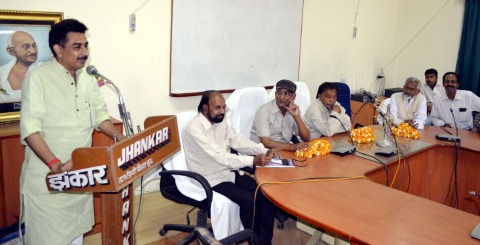More and more attention is being paid to expand the field of
library sciences, which is why it promises to be a good career
choice. The shift from a physical/print model to virtual/digital
one has created new opportunities and challenges for delivering
information solutions to library user.
``Books are my balloons!
They lift me out of one world into another''!
LIBRARIES are repositories of knowledge, information and
entertainment. The traditional concept of a library as a place to
access papers, records or books, is being redefined to one that
also houses the most advanced media, including CD-ROMs, the
Internet, virtual libraries, and remote access to a wide range of
resources. Librarians organise information by classifying,
cataloguing, recording and storing books and materials in a
manner that are easily accessible to the clientele. Librarians
also compile, collect and organise lists of books, periodicals,
pamphlets, articles, and audio-visual materials on particular
subjects.
Librarians are classified according to the type of library they
work in - public libraries, school libraries, media centres,
academic libraries or archives and the type of work they do -
classifier, cataloguer, reference librarian, assistant librarian,
archivist, curator and so on. Librarians are also called
information professionals in libraries maintained by government
agencies, corporations and special libraries.
The work
The different tasks carried out by librarians are --
administrative services, technical services and user services.
There are specialised areas where a librarian may choose to focus
entirely on a particular topic, e.g technical writing, writing
reviews, abstract writing, computation and data evaluation,
bibliography and so on. A deputy librarian looks after
administration, supervision and programming. A reference
librarian researches, retrieves, and disseminates information;
documentation librarian manages the library's online database-
organisation, training, maintenance and assisting the information
service.
The work of an assistant librarian is to acquire books, reference
services, computer programming and supervising of assistants.
Professional assistant help in ordering books, accessing,
classification and cataloguing. Semi-professional assistants
(candidates who have done a certificate course in library science
after SSLC/intermediate) do charging and discharging of books,
shelf arranging, maintenance of books etc. Certain libraries have
specific jobs like an archivist in an archives library or a media
librarian in a publishing agency etc.Courses
Library and Information Science is not a mere academic
discipline. It is a professional course, which involves
practical, observational and experimental study. Education and
training in the discipline is imparted in India at various
levels, ranging from semi- professional, professional to
specialised courses and research programmes.
Certificate and diploma courses range from 3 months to one year
conducted by colleges, universities, and professional library
associations as well as by some women's polytechnics. These
courses are open to students who have completed their
matriculation or intermediate/higher secondary level studies.
Bachelor of Library and Information Science-
This one-year degree course is open only to graduates. In some
cases admission is based on academic merit, in others an entrance
examination determines selection.
Master of Library and Information Science
This is a one-year course for BLiSc students. Graduates from any
other discipline have to undergo a 2-year course.
Distance education programmes or correspondence courses are
useful for working professionals and for those who stay in places
where full-time programmes are not available. It is always better
to opt for a full-time course in this type of discipline, where
there is as much to learn by observing and doing as there is from
theoretical study.
Training
* Students with a professional degree can get hands-on-
experience through apprenticeship in British Council Libraries
and also in some special libraries that offer certifications by
Board of Apprenticeship and Training.
* Master's degree holders in any discipline or anyone who has
completed BLISc and has two year library/documentation
information handling experience can avail of the opportunity and
apply for:
*2-year Associateship in Information Science (equivalent to
MLISc.) at Indian National Scientific and Documentation Centre
(INSDOC), New Delhi
*2-year Associateship in Documentation and Information
Science(ADIS) at Indian Statistical Institute, Documentation
Research and Training Centre (DRTC), Bangalore.
Qualifications
Recruitment to jobs in university libraries is conducted through
the University Grants Commission (UGC) and terms of work and
remuneration are also offered as per UGC rules. However, there
are many private libraries that offer challenging work and good
prospects. A master's degree or at least a bachelor's degree in
library science is necessary for a librarian's position in most
public, academic, and special libraries. In addition, most
special librarians supplement their education with knowledge of
the subject specialisation, sometimes earning a master's,
doctoral, or professional degree in the subject, like in law,
engineering and MBA.
A Ph.D or an M.Phil degree in library and information science is
advantageous for a teaching position, research work or for higher
position in a university library or a large library system. In
fact, with the information boom, qualified librarians can
diversify to several new growth areas like database management,
reference tool development, training of database users, systems
analysis especially relating to computer work, as also
documentation work, desktop printing and publishing, bibliography
work and organisation and management of information units.
Consultancy
Entrepreneurial librarians sometimes start their own consulting
practices, acting as freelance librarians or information brokers
and providing services to academic libraries, businesses, or
government agencies. Many companies turn to consultancies because
of their experience, and knowledge of computer databases and
library automation systems and organisational skills as per the
company's specific needs.
Soft skills
In addition to the professional skills mentioned, a librarian
must be equipped with a wide range of personal and transferable
skills for successful interaction with users. A vital part of
their role is to enhance their professional performance by
improving their communication and interpersonal skills.
Libraries, being the primary source of information in our
society, have had to keep pace with the rapid growth of
information available through technology.
The Information specialist, for that is what a librarian is
today, thus has to deal with a range of sources far beyond boos
and other printed material and play a key role in the process of
communication information.


